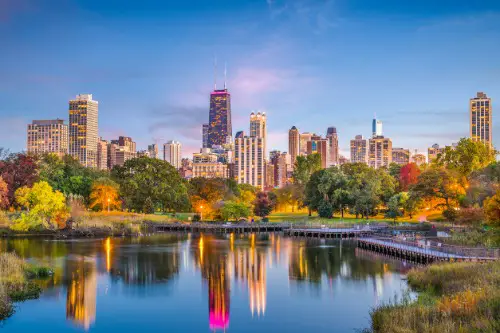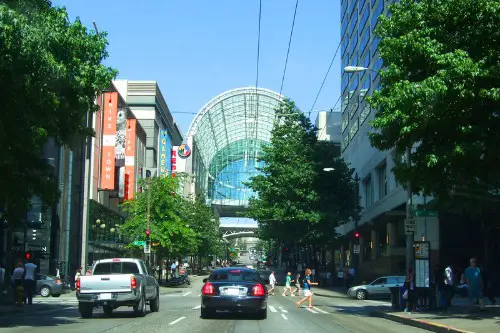1. California

In many California cities, you’re not allowed to blow grass clippings or debris into the street. Doing so can trigger fines—typically around a few hundred dollars—since the debris can clog storm drains and pollute waterways. The rules apply across counties and often span into fines for landscapers, not just homeowners. It’s part of a larger effort to manage runoff and protect local water quality.
Some regions also enforce weeds and height limits in residential and commercial areas. That means that letting things go can bring enforcement visits. If code officials spot overgrowth, they can notify owners and follow up with penalties. These rules reflect California’s environmental and neighborhood standards.
2. District of Columbia

In D.C., grass taller than a set limit (around eight inches) is against code and can trigger a fine. Property owners can be slapped with hefty citations if their yard goes unkempt for too long. The city enforces this to maintain neighborhood appeal, and enforcement can come via visual inspection or citizen complaints. So if you let your lawn grow wild, don’t be surprised if a warning—or a ticket—shows up.
Landscaping mistakes can also bring attention to other yard-related violations. For example, overgrown yards might mask debris or block sidewalks, prompting code enforcement to look closer. Penalties can escalate if the city has to step in and handle the clean-up. That means letting things go can cost you more than just trimming with a mower.
3. Minnesota

In many Minnesota cities, letting your grass reach jungle heights isn’t just unsightly—it’s illegal. Municipal codes often include both maximum grass height standards and noise ordinances tied to mowing times. That means if your mower is too loud early in the morning or late at night, you could get fined. Combine that with restrictions on dumping grass clippings and you’ve got a set of strict local rules.
Violating these rules can result in fines from the city, ranging from modest penalties to upwards of several hundred dollars. Repeated offenses may bring steeper charges or even liens placed on your property. City officials use these codes to encourage responsible yard care and community upkeep. So even though Minnesota feels relaxed, your lawn has to stay in order.
4. Iowa

In several Iowa cities, grass height limits are common and enforced regularly. If your lawn exceeds the allowed green ceiling, you might receive a “notice and order” giving you a set period to fix things. Miss that window, and fines can start at a hundred dollars and climb from there. It’s the local government nudging homeowners to keep things tidy.
Noise ordinances also apply when you mow—and they usually forbid running power tools late at night or very early in the morning. That makes evening mowers especially susceptible to tickets. The goal is to balance lawn care with neighborhood peace. So if you’re hoping to mow after dinner, watch the clock.
5. Florida

Many Florida municipalities regulate both tall grass and yard debris disposal. In certain cities, grass over a specific height—usually around a foot—can prompt citations. Additionally, blowing clippings onto streets is often prohibited and can result in daily fines until corrected. These rules are typically enforced hot and heavy during the wet season.
Local governments also clamp down on mowing times, setting quiet hours when no machines are allowed. That means evening or early morning mowing may land you a ticket. Combined, these rules are enforced to maintain aesthetics, prevent litter, and ensure community peace. So whether you’re mowing or clearing clippings, follow the local limits.
6. New York

In New York City, residential properties have requirements to maintain yards and front lawns under city code. Letting grass, weeds, or shrubbery exceed certain heights can draw a violation. Notices often arrive with warnings and a window to fix the issue, followed by fines if ignored. The city aims to keep sidewalks clear and neighborhoods looking sharp.
Plus, debris on public sidewalks or streets is actionable, and enforcement can include fines or mandated clean-up. This includes grass clippings left over after mowing. New York also restricts noisy work in the early morning or late evening to reduce disruption. Between code and noise laws, mowing in the city comes with more than just elbow grease.
7. Illinois

Several Illinois municipalities enforce ordinances about maximum grass height on private properties. Once vegetation hits that limit, inspectors can issue corrective notices. Failure to comply by the deadline can lead to citations and escalating fines. Sometimes, repeated cases can even lead to the city stepping in to mow and billing the owner.
Some towns also prohibit letting cuttings accumulate where they can block drains or streets. If landscapers or homeowners mow and don’t clean up, fines could result. The emphasis is on preventing yard debris from becoming a public nuisance. As with many states, keeping your lawn in check is both civic and aesthetic.
8. Texas

In Texas, city-level codes often set limits on grass, weeds, and debris near roadways. If your yard crosses the threshold, expect a warning notice with a timeframe to remedy it. Ignoring it could lead to fines—typically a few hundred dollars per violation. More seriously, the city may hire someone to mow and then bill you back.
Another big rule: blowing or dumping clippings into streets is commonly banned. That’s done to avoid clogging stormwater drains. Even landscapers are often held accountable during inspections. This policy protects both infrastructure and curb appeal.
9. Massachusetts

In Massachusetts’ urban areas, there are laws requiring reasonable upkeep of lawns and yards. If your yard develops long grass or brush, it can attract rodents or harbor pests, and city inspectors take note. Violations are issued with deadlines and fines—typically at least a couple hundred dollars. Allowing these conditions to persist can saddle homeowners with cleanup bills.
Also, scheduling matters: lawn equipment use is regulated by local noise ordinances. Early Saturday morning or after 8 PM on weekdays might be off-limits for mowing. The goal is to maintain livable, attractive neighborhoods without disturbing residents. So plan your yard work accordingly.
10. Oregon

Oregon cities—including Portland—commonly enforce nuisance ordinances covering overgrown greenery. If your grass or weeds exceed the limit, the city notifies you with a set period to cut it. Consequences for non-compliance can include fines that rise daily. In some cases, officials may bring in crews to do the job and then charge you.
Debris ordinance rules also apply to blowing clippings into public spaces. That can result in separate penalties aimed at protecting water and reducing litter. The emphasis is both on beautification and environmental protection. So check both your mower schedule and how you dispose of clippings.
11. Georgia

Many Georgia counties and cities have property maintenance codes that include limits on grass height. If you ignore a notice, fines begin to accumulate—starting in the low hundreds. Repeat noncompliance may lead to liens or court orders to cover cleanup costs. Code enforcement uses these rules to ensure neighborhoods stay tidy and safe.
Also, blowing clippings or leaves into streets is typically prohibited. That behavior can come with fines, since it interferes with stormwater management. It’s part of keeping infrastructure running smoothly and corridors clear. So whenever you mow, think cleanup—and timing—too.
12. Washington

Cities like Seattle enforce landscaping standards requiring grass and weeds to stay below a certain height. If they exceed that, inspectors can issue notices giving you time to fix it. If you don’t, fines kick in and can accumulate daily. In tough cases, the city might arrange cleanup and pass the bill along.
Furthermore, debris can’t just blow away into streets or storm drains—doing so violates litter and water protection regulations. Enforcement includes both fines and required clean-up plans. These rules apply whether you’re homeowner or landscaper. Mow smart, clean smart, and keep checks on the ordinance you’re under.
This post 12 States Where You Can Now Be Fined for Mowing Your Lawn Wrong was first published on American Charm.


